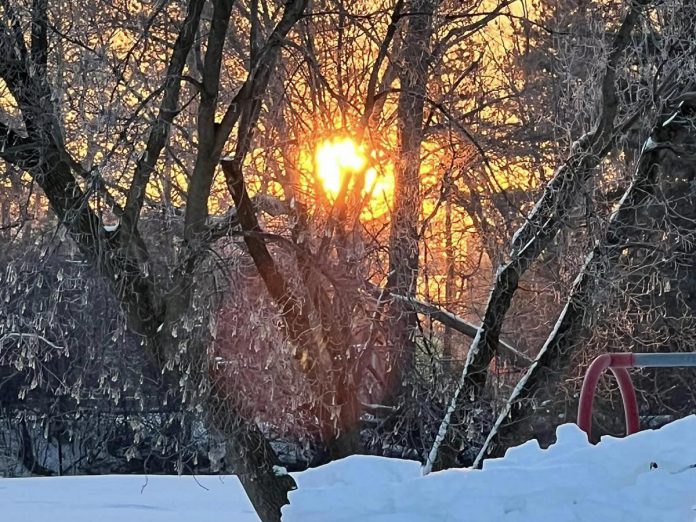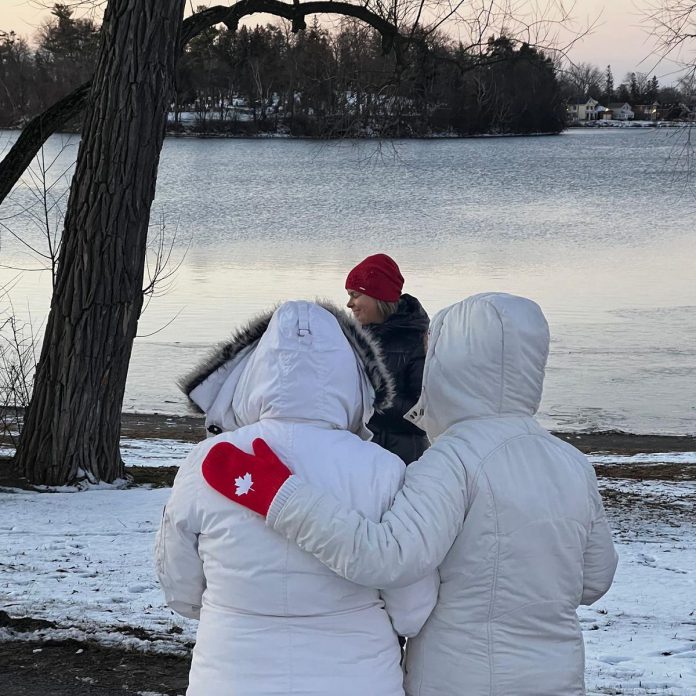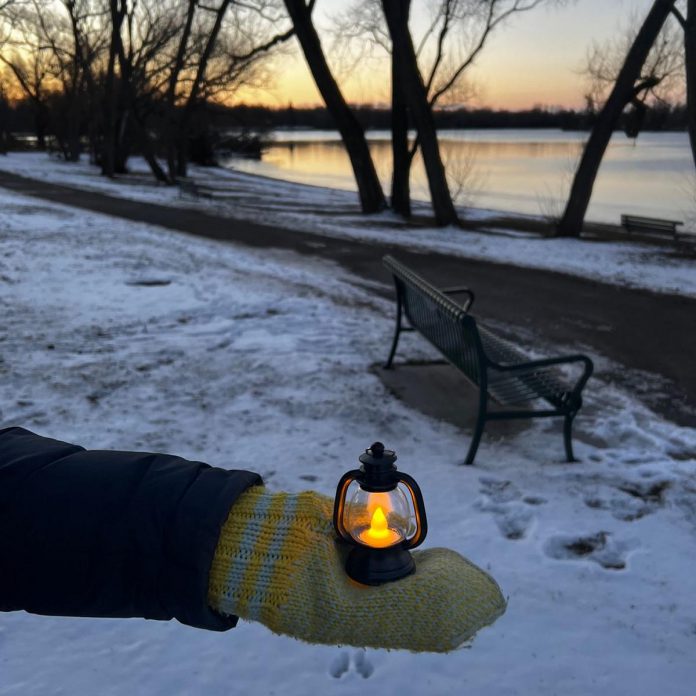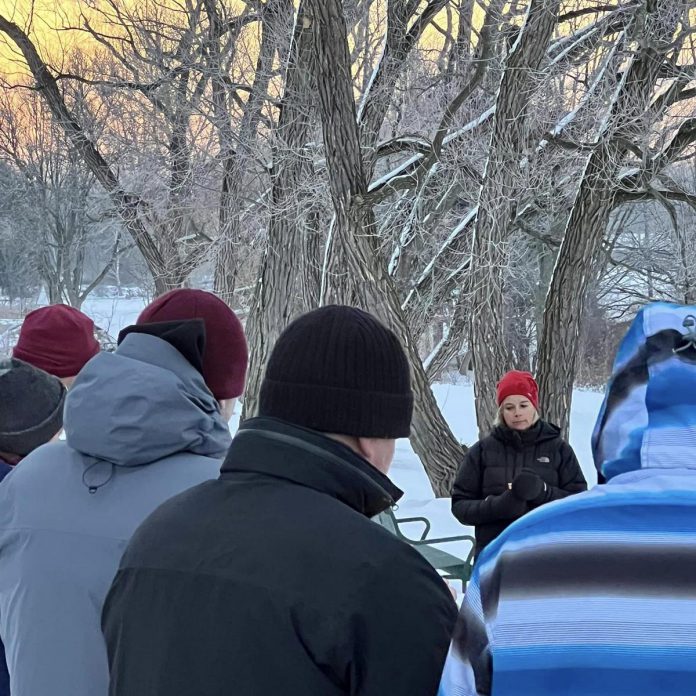
As the early morning sun rises over Rogers Cove on Saturday, December 21st, Julie Brown will find herself in the very familiar role of facilitating a safe and welcoming space for those grieving the loss of a family member or friend due to suicide or overdose.
Hosted by the Greater Peterborough Health Services Foundation (GPHSF) with support from Seven Hills Developments, the fourth annual Darkness to Light gathering begins at 7:45 a.m., but guests are encouraged to arrive by 7:30 a.m.
As the first morning of the winter solstice grows brighter, a supportive message from Brown will be followed by a moment of silence in honour of those being remembered.
While advance registration is encouraged, people can show up unannounced. The event is free to attend but, donations will benefit suicide bereavement work at Hospice Peterborough. To register or to donate, visit www.gphsf.ca.
Brown, who is returning to lead the event, is well qualified to do so, bringing her masters in counselling psychology and more than 20 years’ experience as a registered psychotherapist to the role.
Through her Peterborough-based practice Tabono Therapy as well as her supportive care work as a consultant with Hospice Peterborough, working with individuals and families navigating the palliative care journey as well as those struggling with their feelings post-death, Brown has brought her own light to the darkness overwhelming those she sits down with.

While acknowledging there is some truth to the premise that everyone grieves differently, Brown notes grief is “a universal human experience.”
“It is not a condition. It is not a disease. Sometimes we pathologize people where we think their grief has gone on for too long or it has been too intense, but it’s really a developmental phase of life.”
“If you spend any time on this earth, it is a given that you will lose someone or something that is important to you. But how grief manifests itself, how it might look on the outside or be experienced, you might see more of something in one person and less of it in someone else. So, in that sense, grief is unique (for each person) but it’s all common, similar and universal.”
Further, says Brown, grief doesn’t have an expiry date, as evidenced by her counselling of a current client.
“We are talking about a death that happened 60 years ago that was never given time and space (enabling) the ability to process it,” she says.
“Why are we talking about it now? Because there was another very tragic death in that person’s life. It was a trigger and we’re right back there. We don’t get to go around it (grief) and, if we do, we can only do that to a certain point until something else in life catches up with us.”
“When people come in to see me, sometimes we’re talking about the most recent loss. Sometimes that loss is a divorce, or a loss of friendship, or a loss of job. That grief feels the same, but what we’re talking about is an unprocessed grief from earlier in their life.”

Tragic deaths, such as those the result of suicide or overdose, bring a different grief to the fore than a death from natural causes that comes after a long and fruitful life.
“You’re sad and that deserves to be honoured, but there’s not a sense of trauma or a tragic nature — it’s not a death out of order,” says Brown about a death from natural causes. “We expect, as people age, and certainly as they move into their late 80s and 90s, that death is a natural progression of life. We can make sense of that easier.”
“It’s when death shows up unexpectedly in a way that doesn’t make sense to us, or a death out of order, that can feel very complicated.”
The Darkness to Light gathering, says Brown, is permeated by “a reverence; a sacredness … you feel it.”
“Some of them (the attendees) I won’t end up speaking to. Sometimes they don’t even make eye contact. But there is this sacredness to that space. I am in awe that these people come. That they’re able to get there. That they’re able to stand there. That they’re able, in some way that feels like a miracle to me, to find a way to live in that day with the magnitude of what they carry.”
Brown says Darkness to Light checks two important boxes for those in the midst of a grief journey.
“Grief is very isolating because the experience is like ‘Nobody knows what I’m going through,'” says Brown.
“That’s true. Nobody does know what your grief is like. We need community. We need to feel like when it’s three in the morning and you’re pacing the floor and can’t sleep, there are other people in the community — while we don’t want for that for them — who are living the same experience.”
Brown adds disenfranchised grief — grief that is not acknowledged, supported, or validated by society — is often experienced by those who have lost someone to suicide or overdose.
“It’s a loss we don’t talk about. We sometimes talk about the nature of that death in whispers. We don’t know how to talk about it with people. The result is we often become more focused on how the person died than how he or she lived.”
“What I love about this morning (at Rogers Cove) is we are coming together to hold space. Yes, death connects us but, when I say a few words, I focus on how they were more than how they died. How they died is part of their story, but it’s certainly not the whole story for these people.”

As for our interactions with someone we know is grieving, Brown says a few things come to mind.
“Acknowledge, acknowledge, acknowledge … don’t pretend it’s not there,” she says. “Even if the person is having a good day, grief is never far away but they’ll be OK if you ask them and they’re like ‘Today’s fine.’ What matters to them is that you asked. That can be something as simple as saying ‘I’ve been thinking about you.’
“Put the anniversary of the death in your calendar. Acknowledge it when it’s coming up. Same with other significant dates like Mother’s Day, Father’s Day, Christmas, a birthday. It does matter to people when you send them an email or a text saying you’re thinking of them.”
“Another powerful thing is be curious about the person who died. Say their name. Ask about them. Ask ‘What did Christmas mean to your mother? When you think of Christmas, what really comes to mind for you about her? Did she have something she liked to cook?’ Ask about them and say their name. People tell me, over and over, they want to feel like people haven’t forgotten their person. They want to feel like they still matter.”
Brown says pushback against such enquiries is rare but when it occurs, it’s a reaction “from a protective place … they feel that people don’t really want to hear how hard life still is for them.”
Ultimately, says Brown, those grieving “like to know they’re being held by people.”
“We’re very good at this in the early days and weeks of grief. We’re not good at this months and years out. It’s something that requires quite a bit of conscious awareness.”
But, says Brown, suggesting to someone grieving that there are better days ahead isn’t a good approach.
“When we’re in the depths of grief, that’s not helpful. It’s often interpreted as people saying ‘I just want you to better’. That puts pressure on the griever. When we’re walking through this very dark tunnel, we can know intellectually there’s an end to that tunnel where some light will start to poke through, but when we’re in the midst of the darkness, hearing the light’s coming doesn’t really penetrate.”
“The process of grief is integrating it into our life and carrying it forward. For people with a tragic death like overdose or suicide, I’m talking many, many, many years of integrating it and try to find meaning in life. It is very common that they don’t. There’s very often not hope.”
“When I speak of the light at the event, I refer to it as the light of compassion and kindness. The light of the community that can carry us through dark times. That there’s a cycle of things, from darkness comes light. The idea of impermanence and things are always changing. I try to weave what I say with those kinds of things and try stay away from that idea of good days are ahead.”
When all is said and done, Brown says grief can’t be fixed — an undeniable truth that helps her cope with the emotional toll of her work.
“Giving up that illusion of control allows me to reside in a very patient, open-hearted space with my clients and say ‘I’m going to be right here with you.’ Yes, I’m going to nudge and poke away when I think there are logjams but I don’t pull them somewhere where they’re not ready to be.”
With her colleagues Red Keating and David Kennedy, Brown co-hosts a podcast titled “What Now? On the Threshold of Life, Death and Grief.” To date, it has had more than 22,000 downloads. A new episode on grief and the holidays will be available in December at www.hospicepeterborough.org/programs-overview/what-now-podcast/.


























